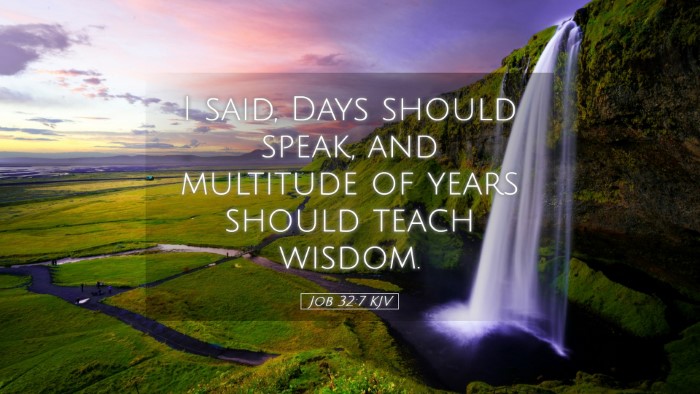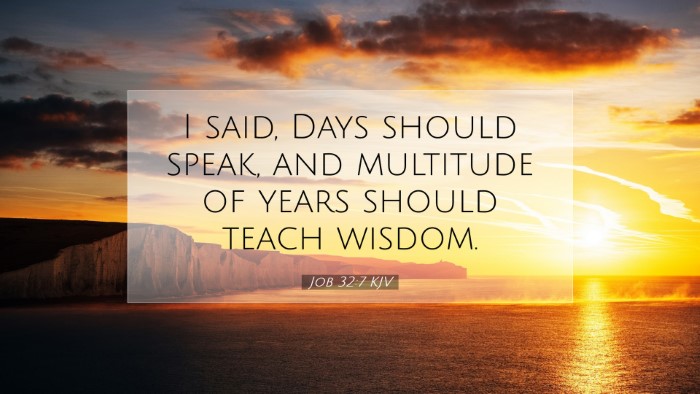Old Testament
Genesis Exodus Leviticus Numbers Deuteronomy Joshua Judges Ruth 1 Samuel 2 Samuel 1 Kings 2 Kings 1 Chronicles 2 Chronicles Ezra Nehemiah Esther Job Psalms Proverbs Ecclesiastes Song of Solomon Isaiah Jeremiah Lamentations Ezekiel Daniel Hosea Joel Amos Obadiah Jonah Micah Nahum Habakkuk Zephaniah Haggai Zechariah MalachiJob 32:7
Job 32:7 KJV
I said, Days should speak, and multitude of years should teach wisdom.
Job 32:7 Bible Commentary
Commentary on Job 32:7
Verse Reference: Job 32:7 - "I said, Days should speak, and multitude of years should teach wisdom."
Introduction
Job 32 marks a pivotal moment in the narrative of Job, where a new voice emerges among the friends of Job, Elihu. This verse encapsulates Elihu's foundational argument regarding the wisdom that should come with age and experience. Through a synthesis of insights from various public domain commentaries, we will explore the theological and practical dimensions of this verse.
Contextual Background
The Book of Job is a poetic exploration of suffering and divine justice, featuring a dialogue between Job, a righteous man undergoing intense trials, and his friends, who offer various theological perspectives on his suffering. Elihu's introduction as a younger voice suggests a shift in tone and perspective.
Exegesis of Job 32:7
Elihu asserts that wisdom is a product of time and experiences, denoting that the accumulated years should impart understanding. This concept aligns with the Proverbs’ frequent allusions to wisdom being a gift from God, often reinforced through life experiences.
Matthew Henry Commentary:
Henry suggests that Elihu’s call for wisdom from age is a reflection on the general expectation of wiser counsel from those who have lived longer. However, he notes that age does not always correlate with wisdom, especially if the experiences are not properly understood or are misapplied.
Albert Barnes Commentary:
Barnes remarks that Elihu challenges the idea that wisdom is restricted to the elderly. Instead, he indicates the potential for anyone, regardless of age, to speak wisdom if they have been granted insight from God. This contradiction elevates the argument that divine wisdom transcends human conventions concerning age.
Adam Clarke Commentary:
Clarke elaborates on the philosophical implications of Elihu’s statement; he highlights the difference between mere knowledge accumulated through years and true wisdom, which necessitates both experience and divine insight. He notes that wisdom is more than learning from life itself; it is a profound comprehension of the divine purposes behind human experiences.
Theological Implications
This verse delves into the discussion of human opinion and divine authority. While Elihu acknowledges the norm that age begets wisdom, he also underscores the necessity of divine illumination to enrich understanding. Such a stance provokes modern contemplation on authority in theological discourse, as it suggests that wisdom can be found in unexpected places.
The nature of wisdom becomes a central theme. Elihu’s challenge prompts readers to reflect on the sources of their understanding of God. Are they relying solely on human experiences, or are they seeking divine revelation? The implications of this inquiry are critical for theologians and students alike, urging a continual search for wisdom informed by both life and divine context.
Practical Applications
For Pastors: This verse serves as a reminder that pastoral wisdom does not always align with age. Fresh perspectives from younger congregants may often provide profound insights into the Word and modern application of its truths.
For Students: The emphasis on learning from both experience and divine revelation underscores the importance of combining academic rigor with spiritual discernment. Students of the Bible are encouraged to engage both with the text and with the Holy Spirit in their studies.
For Theologians: The discourse on the nature of wisdom invites a deeper exploration of ecclesiology and the diversity of voices within the church. Evaluating who is deemed wise and worthy of being heard is crucial for fostering a holistic understanding of God’s revelations.
Conclusion
Job 32:7 serves as a significant turning point in the dialogue of Job, unveiling the complexity of wisdom and its sources. Elihu’s assertion challenges the status quo regarding age and knowledge, bringing forth themes that resonate with contemporary discussions within theological circles. As we reflect on this passage, let us pursue insights that challenge our paradigms of wisdom, drawing from both experience and divine instruction.


